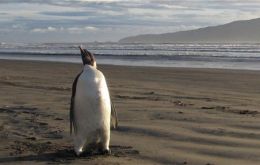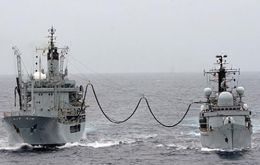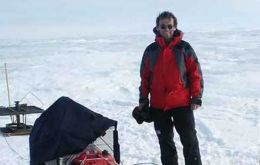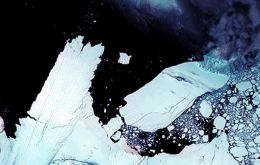MercoPress. South Atlantic News Agency
Antarctica
-
Wednesday, September 7th 2011 - 11:01 UTC
King crabs found on the edge of Antarctica as a result of warming waters

King crabs have been found on the edge of Antarctica, probably as a result of warming in the region, scientists say. Writing in the journal Proceedings B, scientists report a large, reproductive population of crabs in the Palmer Deep, a basin cut in the continental shelf.
-
Tuesday, September 6th 2011 - 11:09 UTC
‘Happy Feet’, the penguin beached in NZ released to return to Antarctica

‘Happy Feet’, the lost Emperor penguin who became a worldwide celebrity after he washed up on a New Zealand beach was released back into the Southern Ocean on Sunday to begin a long swim home to Antarctica.
-
Friday, August 26th 2011 - 04:13 UTC
Argentine Claims on the South Atlantic Remote Islands

Argentina’s claim to the Falkland Islands is well documented, but lesser known is her continued claim to South Georgia and the South Sandwich Islands.
-
Thursday, August 25th 2011 - 06:33 UTC
HMS Edinburgh visits South Georgia to test land and sea forces

HMS Edinburgh visited this month South Georgia as part of her six-month South Atlantic and Falkland Islands duties which included training soldiers in a cold weather environment and give sailors the chance under such challenging conditions.
-
Friday, August 19th 2011 - 09:59 UTC
First complete map of Antarctica ice flow speed and direction

The first complete map of the speed and direction of ice flow in Antarctica will help scientists to track future sea-level increases, according to the team behind the project.
-
Wednesday, August 10th 2011 - 07:21 UTC
Japan’s March tsunami crossed the Pacific and fractured Antarctic ice

The tsunami caused by the 11 March Tohoku earthquake in Japan crossed the Pacific and broke off large chunks of ice from Antarctica, a study has shown.
-
Tuesday, July 26th 2011 - 19:13 UTC
Brazil second scientific station in Antarctica, 500 km from the South Pole

Brazil is planning to set up its second scientific station in Antarctica and its first fully automatic data collecting module close to the Southern pole, revealed Jefferson Simoes coordinator of the country’s National Science and Technology Institute.
-
Wednesday, July 20th 2011 - 18:48 UTC
Antarctica 2010/11 visitors totalled 33.824, down 8.3%, says IAATO

With the formal end of the tourism season in the Antarctic, the International Association of Antarctica Tour Operators (IAATO) has released its final numbers for 2010-11. The total number of visitors to the region traveling with IAATO member-operators was 33,824.
-
Wednesday, July 20th 2011 - 11:30 UTC
Fantastic fund raising helped clear rodents from 600 hectares in South Georgia

A fantastic £60,000+ of funding was raised for the SGHT Habitat Restoration Project on South Georgia in the 2010-2011 season thanks to the many visitors who sponsored a hectare.
-
Tuesday, July 19th 2011 - 13:22 UTC
South Georgia set of stamps to celebrate marriage of Prince William and Kate

A set of three stamps, a beautiful souvenir sheet-let and two first day covers will be released by South Georgia and the South Sandwich Islands on July 25th to mark the recent Royal Wedding, reports the June edition of the South Georgia Newsletter.
